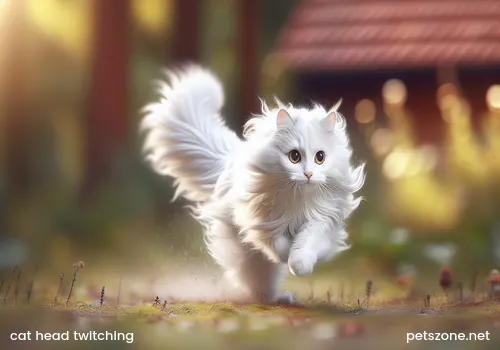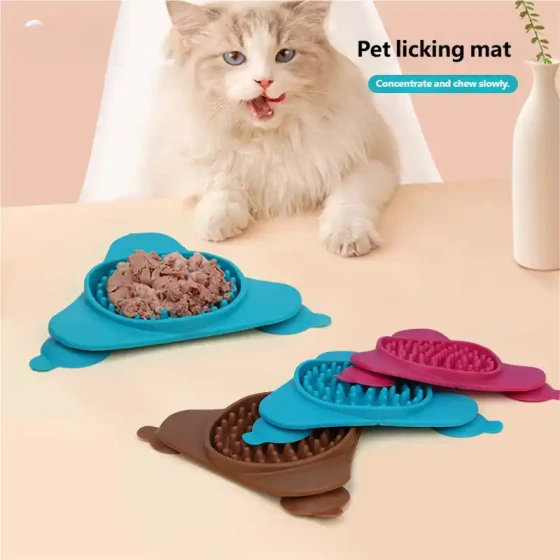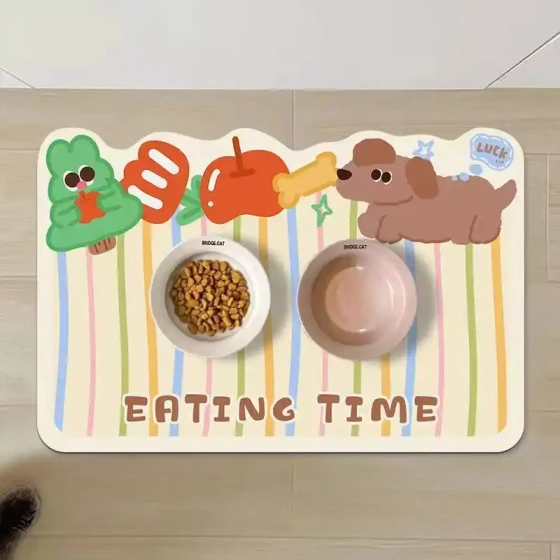Cat's Head Twitching Occasionally_5 Common Causes of Cat Head Twitching
Occasional head twitching in cats may be a situation that pet owners occasionally encounter, similar to humans shivering or making small movements. Sometimes it is a harmless normal physiological response, but sometimes it can be the body "sending a warning," indicating some potential health problems. Therefore, understanding the common causes of cat head twitching can help us better protect the health of these "fur babies."
Cat head twitching usually refers to involuntary, rhythmic shaking or twitching of the head. This condition can vary from mild to severe. Mild cases might only involve slight muscle tremors, while severe cases may even involve full-body convulsions. When your cat exhibits this symptom, first do not panic, remain calm, and observe carefully. Try to record the characteristics of the twitching, such as duration, frequency, whether accompanied by other symptoms, etc. This information is crucial for the veterinarian’s diagnosis.
5 Common Causes of Cat Head Twitching

The reasons for cat head twitching are varied, from mild discomfort to serious diseases. Here are five relatively common causes:
1. Neurological Issues: Signals Hidden Deep in the Brain
The cat's nervous system is the command center for bodily activities. Once there is a "glitch," symptoms like twitching may appear. Among these, epilepsy is the most common neurological disease. During an epileptic seizure, cats may experience full-body convulsions, limb stiffness, drooling, loss of consciousness, and urinary or fecal incontinence. Head twitching may also manifest as partial epilepsy. Sometimes before a seizure, a cat may act restless, hide, pace back and forth, or howl abnormally.
Besides epilepsy, other neurological diseases such as brain tumors, encephalitis, hydrocephalus, stroke may also cause head twitching. These conditions may compress or affect brain nerves, causing intermittent twitching. In special cases, such as cerebellar hypoplasia caused by feline panleukopenia virus infection, kittens may show head tremors and uncoordinated gait. This tremor typically does not worsen as the cat grows. Additionally, some degenerative brain diseases can also cause head tremors.
When neurological problems occur, twitching is often caused by abnormal neuronal discharges, like a short circuit, which prevents the body from properly controlling muscle activity.
2. Poisoning: A Potential Household Crisis
Cats are curious and love to explore, which makes them prone to accidentally ingesting toxic substances at home, leading to poisoning that manifests as twitching. Common cat toxins include:
- Human Medications: Such as painkillers, cold medicines, which can be highly toxic to cats.
- Cleaning Products: Disinfectants, hand sanitizers, etc.
- Toxic Plants: Common ones include lilies, daffodils, and ivy.
- Insecticides and Rodenticides: Especially those containing pyrethroids (e.g., permethrin) found in dog flea and tick treatments, which are highly toxic to cats and can cause severe twitching.
- Certain Foods: Chocolate, grapes, onions, and other human foods toxic to cats.
Twitching caused by poisoning usually appears suddenly and may be accompanied by vomiting, diarrhea, drooling, lethargy, unsteady walking, and abnormal pupils. If poisoning is suspected, immediate veterinary attention is essential; do not try home remedies.
3. Nutritional Deficiencies or Metabolic Disorders: The Body’s "Low Battery"
Normal body function depends on balanced nutrients and electrolytes. Problems in these areas can also cause head twitching.
- Hypocalcemia: Calcium is vital for normal neuromuscular function. Low calcium levels cause muscle spasms, twitching, or even seizures. This is common in nursing mother cats due to high calcium consumption during milk production. Long-term unbalanced diets or conditions such as kidney disease may also cause hypocalcemia.
- Electrolyte Imbalances: Electrolytes like calcium, potassium, and magnesium play key roles in muscle function. Dehydration, severe vomiting or diarrhea, and kidney diseases can cause imbalances, leading to muscle tremors or twitching.
- Hypoglycemia: Low blood sugar can cause nervous system dysfunction, resulting in brief twitching, coma, or other symptoms. This is more common in diabetic cats with insulin overdose or kittens fasting for long periods.
4. Pain or Discomfort: The Body’s "Protest"
When a cat feels pain or discomfort, it may express it through head twitching or shaking.
- Ear Problems: This is the most common cause of frequent head shaking or twitching in cats. Ear mites, infections (bacterial or fungal), hematomas, foreign bodies, and inflammatory polyps in the ear can cause intense itching or pain, leading to frequent scratching and head shaking, which looks like twitching. If the cat’s ear is red, swollen, has odor or discharge (black or dark brown waxy substance), or shows pain when touched, ear issues should be highly suspected.
- Oral/Dental Problems: Dental disease or oral pain can cause head shaking or facial twitching, sometimes accompanied by drooling, bad breath, and loss of appetite.
- Pain or Injury Elsewhere in the Body: Pain from arthritis, muscle injury, etc., can cause localized or whole-body muscle tremors including the head.
5. Psychological or Behavioral Factors: Small Emotional Waves
Cats also have emotions, and strong emotional fluctuations can sometimes cause brief physical reactions including slight head twitching.
- Stress or Anxiety: Moving house, strangers at home, loud noises (hairdryer, vacuum cleaner), forced bathing or traveling can make cats anxious or stressed, causing trembling, rapid breathing, increased heart rate, and sometimes slight head twitching.
- Dreaming: Indeed, like humans, cats also dream during deep sleep! When they dream about chasing, playing, or eating, their legs, mouth, or face may twitch unconsciously. This is generally a harmless physiological response. If twitching only occurs during sleep and the cat is normal upon waking, excessive worry is unnecessary.
- Excitement: Some cats may exhibit mild muscle tremors when extremely excited.
When to Seek Immediate Veterinary Care?
Although some head twitching is normal, pet owners should immediately take their cat to a vet if any of the following occur:
- Twitching occurs frequently or lasts a long time (over 1-2 minutes).
- Twitching accompanied by loss of consciousness, incontinence, foaming at the mouth, limb stiffness, or lack of coordination typical of seizures.
- Accompanied by vomiting, diarrhea, lethargy, loss of appetite, difficulty breathing, abnormal gait, or abnormal pupils.
- Suspected exposure to toxic substances.
- Sudden, severe twitching.
- Persistent ear discomfort symptoms, such as frequent ear scratching, head shaking, ear odor, or discharge.
Before visiting the vet, if possible, record a video of the twitching with your phone; this provides valuable diagnostic information.
How to Help Your Cat?
While waiting for veterinary care or during daily care, you can do the following to assist your cat:
- Stay Calm: Your emotions affect your cat. Staying calm helps you better observe and manage the issue.
- Provide a Safe Environment: If the cat is twitching, remove objects that may cause injury to prevent bumps or wounds.
- Record Details: Note the time, frequency, duration, affected body parts, and behavioral changes before and after the episodes.
- Avoid Stimulation: Reduce noise, bright lights, and other environmental stimuli, especially for cats prone to epilepsy.
- Regular Check-Ups: Take your cat for routine health and ear examinations to detect and prevent potential problems early.
- Pay Attention to Diet and Environment: Provide a balanced diet, ensure sufficient water intake, avoid toxic substances, and keep the home environment clean.
Frequently Asked Questions
Q1: Is head twitching normal when cats sleep?
A1: Cats may twitch slightly during deep sleep (REM stage) when they dream. Legs, mouth, or face may move involuntarily—which is a normal physiological phenomenon similar to humans dreaming, usually nothing to worry about. However, if twitching is frequent and the cat is lethargic or abnormal when awake, alertness is needed.
Q2: How to distinguish between normal head twitching and illness in cats?
A2: Normal twitching is usually brief and mild, like twitching during sleep or brief tremors caused by excitement or stress, with quick recovery and normal behavior afterward. If twitching recurs, lasts longer, is severe, or is accompanied by other abnormal symptoms such as drooling, loss of consciousness, vomiting, lethargy, or pain, the cat is likely unwell and needs prompt veterinary care.
Q3: What is the relationship between cat head twitching and ear infections?
A3: Ear infections are a common cause of frequent head shaking or twitching. Ear mites, bacterial or fungal infections cause intense itching and pain, prompting cats to shake and scratch their ears, which appears as head twitching.
Q4: Can calcium deficiency cause head twitching in cats?
A4: Yes. Calcium is an essential electrolyte for normal neuromuscular function. When cats have low calcium (hypocalcemia), nerve and muscle excitability increases, causing muscle spasms and twitching—including head twitching—and may trigger seizures.
Q5: What medication should be given for cat head twitching?
A5: Since causes are complex, do not medicate on your own. Incorrect drugs may be ineffective or worsen the condition, even threaten life. Always seek professional veterinary diagnosis and treatment with prescribed medication.
Conclusion
Occasional head twitching in cats may mean they are dreaming, ear discomfort, or signals of more serious neurological diseases, poisoning, or metabolic disorders. Responsible pet owners should observe daily behavior carefully, remain calm when abnormalities are detected, record details, and promptly seek help from a professional veterinary hospital. Early diagnosis and treatment are key to helping cats regain health and improve their quality of life. After all, these adorable "little emperors" deserve our heartfelt care!
References
- PetMD. Tremors in Cats: Why Is My Cat Shaking?
- OneDegree HK. 貓癲癇| 前兆/原因/發作處理/壽命影響一文睇清
- 里德猫砂. 認識貓咪癲癇,獸醫傳授3招降低發作傷害
- Central Broward Animal Hospital. Common Causes for Muscle Tremors in Cats
- 39健康网. 小猫突然倒地抽搐怎么急救
- Rover.com. Why Does My Cat Shake Their Head & What Can I Do to Help?
- 宠物医院. 猫突然抽搐,过会又好了
- The Spruce Pets. Cat Head Shaking: Causes and Treatment
- Vetster. Head Shaking in Cats - Causes, Treatment and Associated Symptoms
- 新浪网. 猫咪抽搐是什么情况,这四种原因不容忽视
- PDSA. Head shaking in cats
- 正粤宠友. 猫癫痫:症状识别、管理与治疗全攻略
- Gogo Herbs. 貓咪的情緒問題和日常疏導
- 希尔思宠物营养. 貓咪癲癇:發現症狀和該如何處理
- MSD Veterinary Manual. Congenital and Inherited Disorders of the Nervous System in Cats
- 某宠物相关网站. 猫咪玩逗猫棒突然抽搐是怎么回事?
- MSD Veterinary Manual. Disorders of the Parathyroid Glands and of Calcium Metabolism in Cats
- 某宠物相关网站. 猫咪身体有这7个表现,说明“缺钙”了,再不补钙就迟了
- 晋城宠物医院. 猫咪常见的神经系统疾病——癫痫!每一位铲屎官都值得学习!
- Wag! Why Do Cats Twitch in Their Sleep?
- 宠物百科哟. 猫咪耳螨和耳垢有何区别耳螨怎么治
- PubMed. Tremors in cats: 105 cases (2004-2023)
- PetCareRx. Electrolyte Imbalance in Cats: Causes, Symptoms, and Treatment
- VCA Animal Hospitals. Cerebellar Hypoplasia in Cats
- 网易. 癫痫发作的猫该怎么处理? 铲屎官得懂这些要点, 会让猫好受一点!
- 宠物百科哟. 猫耳朵马拉色菌
- 爱宠网. 猫咪中毒为什么会抽搐
- 爱宠网. 猫咪抽搐怎么回事猫咪睡觉抽搐原因介绍
- 布尔药业. 猫咪产后缺钙症状及治疗
- 豆瓣. 宠灵堂宠物善终:猫咪中毒的症状及急救办法
- 宠物医师网. Feline Epilepsy 猫科动物癫痫
- 某宠物健康养护常识网站. 猫摇头是怎么回事
- 宠物行业数据库. 如何保护猫咪耳朵免受感染?预防和护理方法
- 网易. 出门、洗澡、贴胶带...这些应激都可能害死猫?6步缓解猫咪应激!
- 喜马拉雅. 猫咪中毒了临死前表现
- 中芯微实业. 猫咪抖头几天后死亡
- 豆瓣. 猫的应激反应有多严重?为什么出门回家后猫不认识你了?
- Happy Pet Hospital. 雨季狗狗和猫咪常见的耳炎问题
- 喜马拉雅. 猫咪的应激反应到底有多可怕?
-560x560.webp)

-560x560.webp)
